This page has everything you need to know about SSP’s On-Campus Admitted Student Day on Friday, March 31. To jump directly to sections, use the navigation menu on the left (on desktop) or the “Jump To…” menu at the top of the page (on mobile).
COVID-19 Information
Georgetown requires that all visitors to campus be fully vaccinated (including a booster shot) against COVID-19, unless they have a medical or religious exemption. Ahead of your visit to campus, please submit your vaccine documentation through the online portal. On the morning of the event, you will also be asked to complete a brief health survey.
Current Georgetown University students and staff do not need to complete the registration form, as they have already submitted their documentation to the university. Masks are not required.
Back to TopCheck-In, Location, and Attire
You can check in any time between 10:00 a.m. and 12:45 p.m. If you expect to arrive later than 12:45 but would still like to join us, just email securitystudies@georgetown.edu to let us know!
We will spend most of the day in the Healey Family Student Center (HFSC) on campus. When you arrive at the HFSC, enter through any of the main doors and follow signs to the Social Room.
Attire for this event is nice casual or business casual. Note that there is a brief (~5-minute) outdoor walk between HFSC and the mini class locations later in the afternoon.
Back to TopGetting to Campus
The HFSC is located on the southwest side of campus, near the parking garage and shuttle buses. See a map of campus here.
The free Georgetown University Transportation Shuttle (GUTS bus) has pickup locations at the Dupont Circle and Rosslyn metro stops and will drop you off at the GUTS Shuttle Bus Turnaround, just a short walk from the HFSC. The campus is also served by the G2 bus line, and several other DC buses drop off along M Street, a 15-minute walk from the HFSC.
If you plan to drive to campus, the Southwest Parking Garage is the closest option to the HFSC. Use the address 3611 Canal Road NW for GPS directions. Parking is $25 for the day.
Back to Top10:00 – 11:30 | Morning Activities
Morning sessions are largely self-directed, while the afternoon features a series of scheduled sessions intended for all admitted students. Note that some of the below opportunities require you to sign up at check-in.
Campus Tours
Location: HFSC Social Room
See Georgetown’s campus with a current student! Campus tours will depart from the HFSC Social Room at 10:00, 10:30, 11:00, and 11:30. When you check in, you will be able to sign up for a tour time slot.
Financial Aid Appointments
Location: HFSC Meeting Room G313 & Social Room
A member of Georgetown’s Student Financial Services team will be available for 15-minute meetings with admitted students to discuss loans, grants, and other options for financing your studies. When you check in, you will be able to sign up for an appointment. Appointment slots are on a first-come, first-served basis.
Student Groups
Location: HFSC Social Room
Throughout the morning, a number of student groups from SSP and SFS will be in the HFSC to talk about their events and resources for SSP students.
Information for Military-Connected Students (10:30 – 11:30 a.m.)
Location: HFSC Herman Room
Wesley Wilson, Director of the Military and Veterans Resource Center (MAVRC), and Rachel Cardwell, Assistant Registrar for Veterans’ Affairs and Benefits, will hold a session to discuss the options and opportunities for active-duty, veteran, and other military-connected students at Georgetown.
Back to Top11:30 – 12:45 | Lunch
Location: HFSC Social Room
Join our Student Ambassadors for lunch! This will be a casual lunch, so feel free to arrive any time in the lunch period. Vegetarian, vegan, gluten-free, and nut-free options will be available.
Back to Top12:45 – 1:05 | Welcome
Location: HFSC Social Room
Hear from Dr. Daniel Byman, Interim Director of the program; Dr. Joel Hellman, Dean of the School of Foreign Service; and Robert Pinn, SSP Director of Admissions.
Back to Top1:05 – 1:30 | SFS Career Center
Location: HFSC Social Room
The SFS Career Center (SFSCC) offers support for SSP students and alumni at all steps of your career, from updating your resume to negotiating a salary offer. Hear from the SFSCC team about their offerings and ask questions about the resources available to students.
Back to Top1:30 – 1:40 | Break
1:40 – 2:20 | Student and Alumni Panel
Location: HFSC Social Room
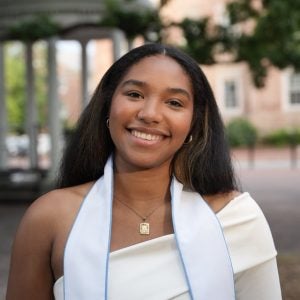
Ashliyn Burgos (SSP’24)
Ashliyn is a first-year student concentrating in Terrorism and Substate Violence. She received her Bachelor of Arts from the University of North Carolina at Chapel Hill in 3 years through the Peace, War, and Defense Department, with a minor in Medical Anthropology. In 2021 she was designated an Intelligence Community Center of Academic Excellence Scholar. Ashliyn has experience working in the private sector and with IGOs, with specific experience with intelligence start-ups, and recently working as an Intelligence Analyst at the World Bank. Outside of that, she has researched the use of female and child suicide bombers by Boko Haram and the intersectionality of Islam and women’s health.
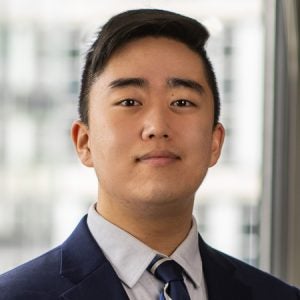
Josh Chang (SSP’21)
Josh is an Analyst at the Center for Strategic and Budgetary Assessments (CSBA), where he focuses on U.S. defense strategy, force planning, missile defense, nuclear deterrence/strategy, and military alliances. In 2022, he was a nuclear scholar at the Center for Strategic and International Studies’ (CSIS) Project on Nuclear Issues (PONI), where he conducted a study on allied views of U.S. nuclear modernization. While at SSP, Josh studied Military Operations and was an Associate Editor for the Americas at the Georgetown Security Studies Review. He also established GSSR’s podcast program, the Precision-Guided Podcast.
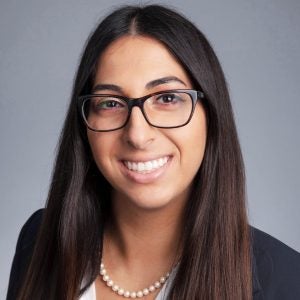
Sophia Gatsios (SSP’20)
Sophia is a cyber threat intelligence analyst at the MITRE Corporation, a not-for-profit that manages federal research labs. She primarily conducts research on countering mis- and disinformation, as well as other information operations. Prior to graduating from SSP, Sophia interned at FireEye Threat Intelligence (now Mandiant) and the U.S. Department of State. During SSP, she concentrated on Technology and Security, and received a scholarship through the National Science Foundation’s CyberCorps fellowship. She has a BA in International Relations from the University of Southern California.
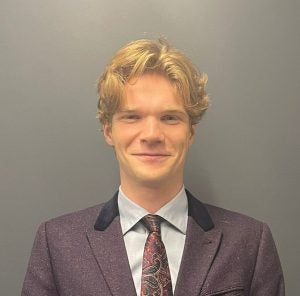
Freddie Mallinson (SSP’23)
Freddie is a fourth-semester student concentrating in U.S. National Security Policy. He received his Bachelor of Arts from the University of Kent in the United Kingdom. At SSP, his research focuses include Congress’ impact on national security policymaking and the politics of the use of force. He has worked in private sector intelligence, the United States Senate, and is currently an intern in the Council on Foreign Relations’ congressional relations division. He is also the Editor-in-Chief of the Georgetown Security Studies Review. After graduation in May, he hopes to stay in the District and work at the intersection of think tanks and the legislative branch.
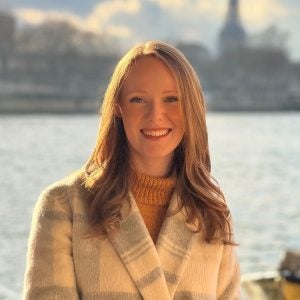
Jessica McDowell (SSP’22)
Jessica is a Cybersecurity Manager in Deloitte’s Government and Public Services practice, where she focuses on risk assessments and mitigation for federal agencies. She previously worked in small business cyber risk and marketing consulting before joining Deloitte in 2020. Throughout her career, Jessica has specialized in developing frameworks to achieve a holistic approach to cybersecurity risk management and federal data privacy and cybersecurity regulations. She graduated from SSP in May 2022 and earned her Bachelor’s in Political Science from the University of Pennsylvania in 2017. She lives in Washington, D.C. with her two cats and her fiance, who will graduate from SSP this summer.
Back to Top2:20 – 2:30 | Break
2:30 – 3:15 | Faculty Panel
Location: HFSC Social Room
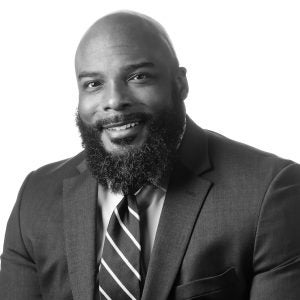
Charles Carithers
Prof. Carithers is an adjunct professor at SSP and a principal at Cornerstone Government Affairs, where he advises a diverse set of clients with interests related to national security, defense, and Homeland Security. Prior to joining Cornerstone, he served as a Professional Staff Member with the Committee on Homeland Security in the House of Representatives, advising its Chairman, Rep. Bennie Thompson (D-MS), on various national security and intelligence matters. Before his time with the Committee, Charles spent 11 years in the United States Intelligence Community.
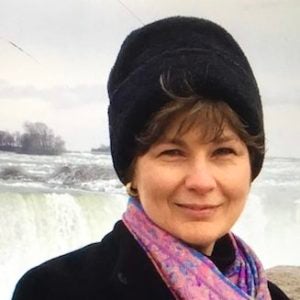
Paula Doyle
Prof. Doyle is an adjunct professor at SSP. She retired in December 2016 as one of three CIA Associate Deputy Directors of Operations, where she oversaw worldwide HUMINT operations and activities that required the use of air, land, maritime, space-based and cyber technologies. She was the Deputy National Counterintelligence Executive from 2012-2014, and led three CIA stations in Europe, the Levant, and Asia. Prior to joining CIA, Paula Doyle was a Foreign Service Officer in three embassies in Latin America and Europe. She is the recipient of several awards from the CIA, the DNI, DIA, and the NRO.
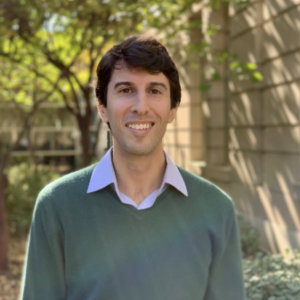
Andrew Imbrie
Prof. Imbrie is a core faculty member and the chair of SSP’s technology concentration, and an Affiliate at Georgetown’s Center for Security and Emerging Technology (CSET). Prior to his current role, he served as a senior advisor on cyber and emerging technology policy to the U.S. Ambassador and Deputy Ambassador at the U.S. Mission to the United Nations. He worked previously as a Senior Fellow at CSET, where he focused on issues at the intersection of artificial intelligence and international security and served as an advisor to the National Security Commission on Artificial Intelligence. From 2013 to 2017, he served as a member of the policy planning staff and speechwriter to Secretary John Kerry at the U.S. Department of State.
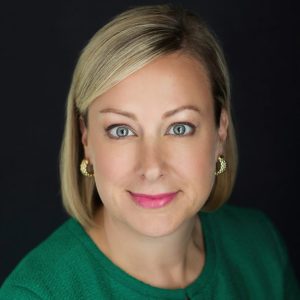
Rebecca Patterson
Prof. Patterson is a core faculty member and has served as the Associate Director of SSP since 2017. Her research and teaching interests include civil-military relations, nation-building, peacekeeping, and post-conflict economics. Most recently, she served as the Deputy Director in the Office of Peace Operations, Sanctions, and Counter Terrorism at the Department of State. A retired U.S. Army officer with more than 22 years of experience, she served in overseas assignments in Thailand, Korea, Iraq, and Afghanistan. She has previously taught at the National Defense University and West Point.
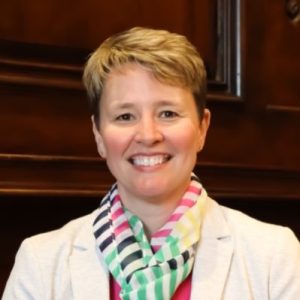
Heidi Urben
Prof. Urben is a core faculty member and Director of External Education and Outreach for SSP. A retired U.S. Army colonel, her research interests include civil-military relations, public opinion, military and defense policy, and national security strategy. A career military intelligence officer, Dr. Urben’s previous positions in the U.S. Army include Vice Deputy Director of Current Analysis and Warning in the Joint Staff Directorate for Intelligence; Deputy Director for Intelligence in the Joint Staff’s National Military Command Center; Military Aide to Secretary of Defense Robert M. Gates; and many others. Her military career included two combat deployments to Afghanistan and a peacekeeping deployment to Bosnia-Herzegovina. Prior to assuming her current position at SSP, Dr. Urben served as a Chamberlain Fellow at Howard University in 2021-2022.
Back to Top3:15 – 3:45 | Break
3:45 – 4:45 | Mini Classes
Get a taste of the student experience with classes from some of SSP’s most beloved faculty members. To ensure that each class stays small, please indicate your preferred class(es) here by 12:00 p.m. (noon) ET on Thursday, March 30. Your class assignment will be shared with you when you check in on Friday. If you do not complete the form, you may sign up for a class upon check-in, with spaces available on a first-come, first-served basis.
Assessing North Korea’s Intentions
Prof. Markus Garlauskas
Intercultural Center (ICC) 104
In this class, students will participate in a practical strategic assessment exercise based on a near-future hypothetical crisis scenario involving North Korea. Prof. Garlauskas will brief the class on the scenario, then guide them as a group through the process of developing strategic assessments of the situation.
About the professor: Markus Garlauskas teaches “Strategic Assessment: North Korea” at SSP. He is the director of the new Indo-Pacific Security Initiative for the Scowcroft Center for Strategy and Security, within the Atlantic Council. He served in the US government for nearly twenty years, including six years as the National Intelligence Officer (NIO) for North Korea on the National Intelligence Council. He also served for nearly twelve years overseas at the headquarters of United Nations Command, Combined Forces Command and US Forces Korea in Seoul. He is an alumnus of SSP’s predecessor, the National Security Studies Program.
The Ethical Use of AI in National Security
Prof. Bishop Garrison
Intercultural Center (ICC) 116
This short course will look at the rise of Artificial Intelligence technology in America and its implications for our national security. Discussion will focus around what are or are not ethical uses for the technology, as well as how the use of AI-associated technologies should be governed or regulated.
About the professor: Bishop Garrison teaches “Strategic Engagement & Ethical AI” at SSP. He is a senior national security executive, veteran, and writer who has served in the military, presidential administrations and campaigns, the nonprofit community, and the private sector throughout his 20-year career. In addition to founding Orange Court Strategies, he currently serves as the Vice President for Government Affairs and Public Policy at Paravision.AI. Most recently, he served in the Biden Administration in the Senior Executive Service as the Senior Advisor to the Secretary of Defense for Human Capital and Diversity, Equity, and Inclusion, and before that was the Director of National Security Outreach at Human Rights First (HRF).
Torture in the U.S., Past and Future
Prof. Elizabeth Grimm
Intercultural Center (ICC) 106
This short course will assess the realities of torture—what the United States did and did not do in the years after 9/11. It will present the historical background of the laws of war before examining the U.S. actions during the wars in Iraq and Afghanistan. We will conclude with a discussion of whether you assess the U.S. government will use those techniques again.
About the professor: Elizabeth Grimm is Chair of SSP’s Intelligence Concentration and teaches “Writing for Security Professionals” and the required course “Theory and Practice of Security.” She is the co-author of the 2022 book Terror in Transition: Leadership and Succession in Terrorist Organizations and the 2017 book Lawyers, Policy Makers, and Norms in the Debate on Torture. She has been recognized as a faculty member of the year by multiple organizations at Georgetown over the years. She received her Ph.D. in Government from Georgetown University, M.A. in Security Policy Studies from the George Washington University, and B.A. in Government and History from The College of William & Mary. She has also worked in the defense and security sectors of the U.S. government. She has a terrible sense of direction and has never had a cavity.
Defense Strategy and the Role of Technology
Prof. Kathy Trimble
Intercultural Center (ICC) 118
This session will examine the role of technology in defense strategy and planning. We’ll take a look at the structural elements associated with defense planning, to include the role of markets. We will also discuss a few current Department of Defense case studies.
About the professor: Kathy Trimble teaches two courses for SSP: “Artificial Intelligence and National Security” and “Advanced Technology, Competition, and National Security.” She has a diverse background spanning over 20 years in the private sector and government service at the intersection of technology, policy and industry. She is currently the Director of Strategic Initiatives at the Office of Commercial and Economic Analysis (OCEA).Previously, she served in multiple DoD offices and concentrated on advanced and emerging capabilities and concepts, including the utility of artificial intelligence and the integration of commercial technologies to meet national security needs.
Back to Top4:45 – 6:30 | Reception
Location: Healey Family Student Center Social Room
Join faculty, current students, alumni, and your future classmates for light food, drinks, and cupcakes from local favorite Baked & Wired.
Back to Top